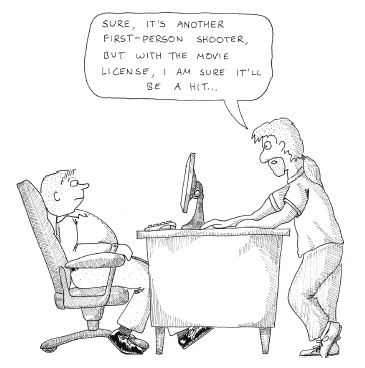A Theory of Fun 10 Years On: Fun Is Just Another Word for Learning

“The only real difference between games and reality is that the stakes are lower with games.”
With A Theory of Fun for Game Design, Ralph Koster has written a truly informative guide–over ten years in its life cycle
“The definition of a good game is therefore ‘one that teaches everything it has to offer before the player stops playing.’ That’s what games are, in the end. Teachers. Fun is just another word for learning.”
And the book does just that: remains informative while keeping one involved to the end. Part of the genius of Koster’s approach is how well he combines the potentially didactic “theory” of game design in a way that makes sure to explore the fun. It’s down-to-earth and his comics throughout add to the tone while frequently driving home some of his main ideas.
“This is an important insight for game-designers: the more formally constructed your game is, the more limited it will be. To make games more long-lasting, they need to integrate more variables (and less predictable ones) such as human psychology, physics, and so on.”
Koster takes seriously the idea that games could be better. He believes that games are only just now entering into a more mature art form. But can games and story intersect authentically? Or does one always supersede the other?
“Games are not stories. It is interesting to make the comparison, though: Games tend to be experiential learning. Stories teach vicariously. Games are good at objectification. Stories are good at empathy. Games tend to quantize, reduce, and classify. Stories tend to blur, deepen, and make subtle distinctions.”
 Perhaps it’s just in how we define what a game is in a story. Is a story such as we currently call “experimental” or “oulipian” literature actually a game in and of itself? Koster spends less time on exploring what a game is within a story, however, and far more focus on the other way around.
Perhaps it’s just in how we define what a game is in a story. Is a story such as we currently call “experimental” or “oulipian” literature actually a game in and of itself? Koster spends less time on exploring what a game is within a story, however, and far more focus on the other way around.
“Games do better at emotions that relate to mastery. Stories can get these too, however. Getting emotional effects out of games may be the wrong approach–perhaps the better question is whether stories can be fun in the way games can.”
This is one of many interesting points Koster makes, and what makes me think of Nabokov’s Pale Fire or Stephan Zweig’s Chess Story or Georges Perec’s The Art of Asking Your Boss for a Raise or Italo Calvino’s mathematical meanings in Invisible Cities. Because, as Koster adds:
“All of these make us feel good when we’re successful at them, but lumping them all together as ‘fun’ just renders the word meaningless. So throughout this book, when I have referred to ‘fun’, I’ve meant only the first one: mentally mastering problems.”
 The point where one’s skill level is constantly challenged but is neither too hard or too easy is the perfect point of gaming fun. Eventually, most games become obsolete because of the fact that once they are mastered the experience is never the same. Could the same be said of a good story? Perhaps, but in fact those narratives that have a game-like complexity add meaning and richness throughout both the initial experience but also follow-up experiences. Take, for instance, the trend in movies in the late 90s and early 2000s when the reader was “tricked” through what was shown or through non-linear plot structures, to re-evaluate the story after. Movies such as Sixth Sense and Pulp Fiction and Magnolia.
The point where one’s skill level is constantly challenged but is neither too hard or too easy is the perfect point of gaming fun. Eventually, most games become obsolete because of the fact that once they are mastered the experience is never the same. Could the same be said of a good story? Perhaps, but in fact those narratives that have a game-like complexity add meaning and richness throughout both the initial experience but also follow-up experiences. Take, for instance, the trend in movies in the late 90s and early 2000s when the reader was “tricked” through what was shown or through non-linear plot structures, to re-evaluate the story after. Movies such as Sixth Sense and Pulp Fiction and Magnolia.
Are these not games? Perhaps, though, this is just a “game” of semantics. We all know crucial aspects of games is the interactivity. But Koster is right, until we connect games with more serious writing–or serious writing with games–the games (which essentially is about moving blocks around obstacles in one form or another) is what we will get. Here’s an idea Koster offers, which, come to think of it, is not entirely removed from The Walking Dead, which has grown enormously in popularity over the past few years and is the quintessential example of a more serious writing approach blended with moral choices–even though it is still about zombies.
“Consider a game in which you gained power to act based on how many people you controlled but you gained power to heal yourself based on how many friends you had. Then include a rule that friends tend to fall away as you gain power.”